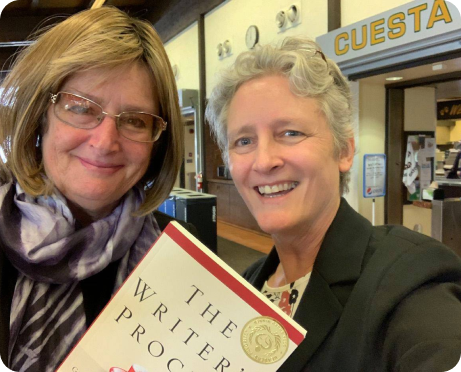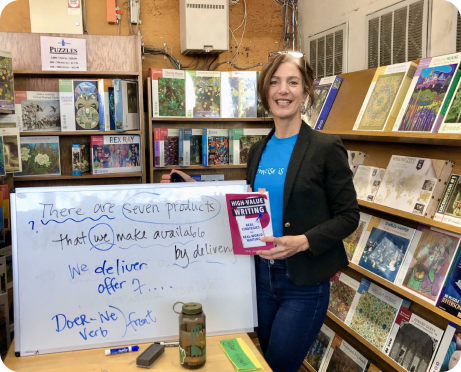Even though you may see yourself as an executive, analyst, scientist, or other business professional, you must not forget that you are a writer, too. As a business professional, your words matter. Your value is in your judgment and insights and arguing your position is the chance to prove your worth. You write for work. You write to lead. In this series, you’ll learn to communicate clearly, edit effectively, and lead with authority.
Although WordRake was conceived as software to edit legal writing, it has been embraced across all industries. Our success is due to our dedication to good writing. Period. Treating legal, business, medical, or creative writing as entirely separate species gives writers excuses to write poorly. We reject that. Writing should be clear and succinct, whatever its purpose.
So once you have the right information, let WordRake help you find the right words. WordRake is editing software for Microsoft Word and Outlook that will give your first drafts the polish of three or four revisions. You’ll get better results in less time and be more persuasive.

Everything you write competes for your reader’s attention with a daily onslaught of words and content. To cut through the clutter, choose brevity. Make it easy for people to get what they need without fighting their way through unnecessary clutter.
Brevity doesn’t come naturally to most of us, but you can make it a regular part of your writing process. In this two-part video series, Erin Lebacqz and Anne Janzer show you why and how to do that.
How can we make sure our messages reach and impact our readers? While we might assume using high-level vocabulary and descriptive sentences will impress our readers, that’s not usually the case. Instead, readers respond more positively to writing they can easily understand and use.
In this two-part video series, Anne Janzer and Erin Lebacqz help you write to be easily understood. You’ll learn to respect your reader’s need for writing they can quickly digest, and you’ll pick up strategies to write clearly and accessibly.
Your words represent you when you’re not present. Do they project authority and confidence? Or do conversational patterns slip into your writing and either erode your authority or shut down collaboration?
In this two-part video series, Erin Lebacqz and Anne Janzer tackle the delicate, and critical, topic of writing with authority in the workplace.
Do you get feedback on your writing at work? Or are you the one who gives the feedback? Either way, you’re part of a relationship between feedback giver and feedback receiver. By treating that relationship with care, you can develop both your writing and feedback skills and your workplace relationships.
In this two-part video series, Anne Janzer and Erin Lebacqz take on the feedback process.
To communicate effectively, business writers should focus on editing for clarity, brevity, and simplicity. It takes effort and dedication to get it right, and it’s difficult to recognize the flaws in your own writing. You need a writing coach by your side and available 24/7 so your written communication reflects your intelligence and brings desired results. Let WordRake help.
We’ve distilled the lessons that writing expert and New York Times bestselling author Gary Kinder has taught in over 1,000 writing programs into a powerful software program. WordRake uses complex, patented algorithms to rid your writing of business jargon, needless words, weak lead-ins, clichés, dull phrases, redundancies, unnecessary modifiers, and more.
Editorial feedback and a commitment to clarity shouldn’t be reserved for major projects and long documents. All business communication can be improved—no matter how short or routine. Software like WordRake will help any writer reconsider jargon and wordiness. Simply seeing each suggested edit on your screen will raise questions and promote deeper thinking. Now, every writer in your organization can benefit from a sophisticated editor with deep knowledge. With WordRake, editing advice is always available at the push of a button. Try WordRake for better writing in Microsoft Word and Outlook.
Anne Janzer is a nonfiction book coach and the author of multiple award-winning books on writing, including The Writer’s Process and Writing to Be Understood. She is fascinated by the science and mystery of writing, and is always searching for clues to better communication. Find her books and blog posts at AnneJanzer.com.

Erin Lebacqz created the High-Value Writing program to help business writers develop more clarity and confidence in their writing. Her book, High-Value Writing: Real Strategies for Real-World Writing, is based on conversations with thousands of writers around the world, and provides down-to-earth strategies and examples. Erin has been teaching writing for 25 years, both in the United States and internationally.

I am always excited to work with people who share my commitment to improving business communication, so WordRake is a great partner. They make me feel like that English major was worthwhile!
WordRake is like a power boost for revising, spotting the insidious ways we add clutter or confusion to our writing. Using WordRake will instantly improve writers’ brevity and clarity. Even for more nuanced writing topics like giving feedback or writing with authority, WordRake plays a critical supporting role.
Like everyone, I struggle to fit a lot into each day—and sometimes it’s hard to muster excitement for revising a short project. WordRake gives me an extra set of “eyes,” accelerating the revision process and keeping me honest. It spots issues that I can’t see when I am too close to the writing.

Creating this series with WordRake excites me because, by partnering with WordRake, business writers can better meet their goals. We use writing to both inform and connect, and WordRake helps with both goals by identifying words and phrases that clearly inform and that aid in trust-building and connection. By using the strategies in the series, and then layering on editing with WordRake, writers can create emails and other writing they feel proud of.
WordRake helps writers identify words and phrases that may be weakening their writing. We can’t always recognize our own writing patterns, but WordRake helps us notice and address them. WordRake also helps writers start to understand their own writing tendencies—and reflect on what they’d like to change. The program can help all writers strengthen their messages, and also helps build good editing and revision habits.
WordRake has helped my writing by helping me recognize patterns I often use in my writing. WordRake helps me identify potential “tonal fails” and revise before I send my work into the world with a tone that’s not ideal.
